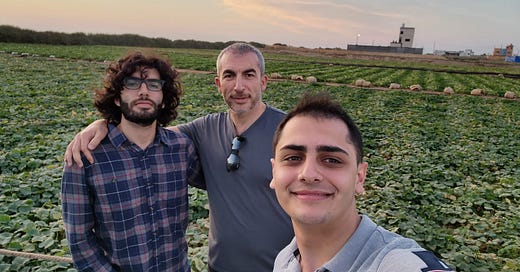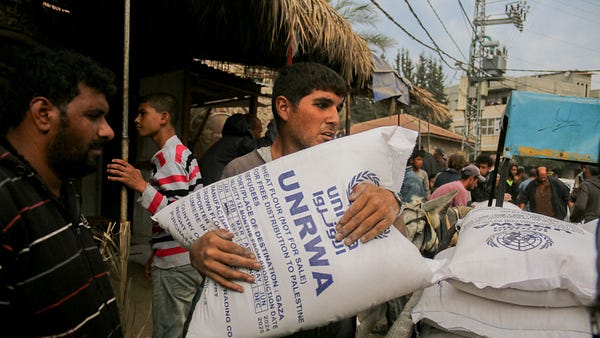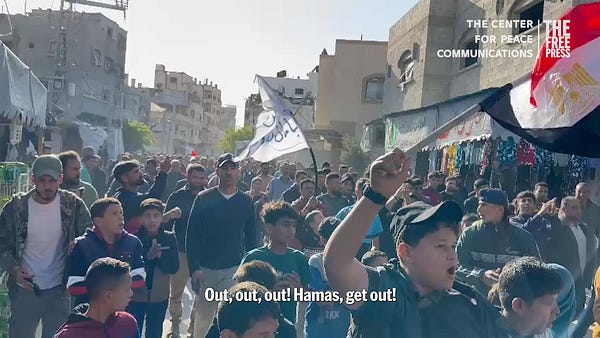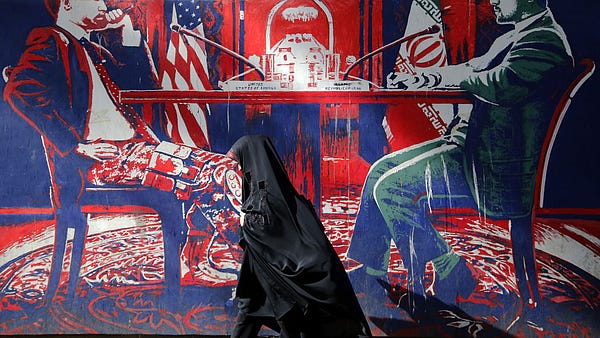
The Free Press

Amjad Abukwaik, 54, was born in Gaza. Today he lives in Paterson, New Jersey, where he owns a pharmacy. Here, he reflects on his life growing up as a Gazan before moving to the U.S. at 19, and why he took his son back last year to visit.
As a teenager in Gaza, I sat on my bedroom floor, secretly making Palestinian flags for a protest against the Israeli soldiers, who seemed to stand on every street corner—glaring at us and holding guns.
It was just two of my friends and me.
In our 17 years, all we’d ever known was a life under Israeli rule. Sometimes we’d throw stones at the IDF soldiers who stood outside our school. Or we’d even burn tires to create a barrier between us. Today our act of resistance was sitting there, preparing flags.
Then my mom flung open the door.
“Holy shit,” she gasped. “What are you doing?”
I explained that we were making flags—that we were planning to go stop Palestinian workers and convince them not to show up for their factory jobs in Israel. We figured the Israelis might listen to our pain if their production lines suffered.
“You can’t,” she said. “You have to be careful.”
But you know who woke me up in the middle of the night to get ready for the protest?
My mom.
“Get up and go do it,” she said when she woke me at 3 a.m. “You have to.”
She wasn’t wrong to be worried—what I was doing was dangerous. We held up traffic at intersections in Gaza City, trying to stop Palestinian workers from heading into Israel. I wore a mask, but still sometimes soldiers chased me, and I knew I could’ve ended up injured or in jail.
But sometimes the anger built up in us, and even if we just threw a stone, it helped release what we felt: that this is our land, and we just wanted to live here in peace. I love the Jewish people. My issue has always been with the state of Israel.
I’ve been back to Gaza twice since coming to America in 1988, when I arrived to study journalism, and then pharmacology, after the language barrier was too hard to get over. At the time, I didn’t speak a word of English.
Last year, my son, who had just graduated from college, turned to me and said, “You know what, Dad? I would like to go to Gaza.”
I was touched that he felt like he had a place there, and that despite growing up with the comforts of America, he yearned to connect with our ancestral home.
So when we went, I wanted him to know how Gazans really live. What they go through every day.
One night, we drove to a graveyard in Gaza City, where the poor sleep on the tombs and in coffins. We saw them there, living among the rats. And when we were ready to go, we got in our car and flipped on the headlights. We saw hundreds of rats, scurrying. It was as if someone opened a cage of them and just let go.
We were shocked to see people—young people, too—living like this. But I wanted my son to appreciate what he has back home.
I told him, “A lot of people don’t have even one percent of what you have.”
I wanted him to know that he has to share what he has. He has to be a good person.
And now, so much of my beloved Gaza is gone. Over the past few days, entire buildings have been leveled. I received word recently—my phone pinged with a text from WhatsApp—that my cousin and four of her kids, along with her father-in-law, mother-in-law, sister-in-law, and brother-in-law, were killed by an Israeli air strike while in their home on Monday.
One bomb, and they’re gone.
I’ve been crying these past few days. I can’t stop watching the news, and I haven’t been able to work. All I do is check for updates.
Today, a woman I knew from Gaza came into the pharmacy. Immediately, she wanted to talk about what’s happening there.
“Please,” I begged. “Don’t say anything.”
Then I went to the bathroom and wept.
Even though I am now living peacefully in New Jersey, I will never forget my people. The pharmacy I own is named Sheefa, after Al-Shifa Hospital, where I was born in Gaza. That same hospital is now running short on fuel, with dying children crammed in its corridors.
Do you know what shifa means? It means to cure.
Amjad Abukwaik is a pharmacist in Paterson, New Jersey, and is married with five kids—two daughters and three sons. Read Jacob Katz’s Free Press piece about being an IDF soldier on the other side of the fence.
And to support more of our work, become a Free Press subscriber today:


















Why do they not blame Hamas? Gaza was turned over to the Palestinians in 2005 to self-govern. In 2006 they elected Hamas. And, as I understand, there has been no election since 2006. Why do none of the wealthy Arab countries help Palestine? I'm sure that they must know how inhumane Hamas is.
thank you amjad for this. as someone with little knowledge of this situation i tend to hear only one side of this story though my gut has always told me it is much more complicated